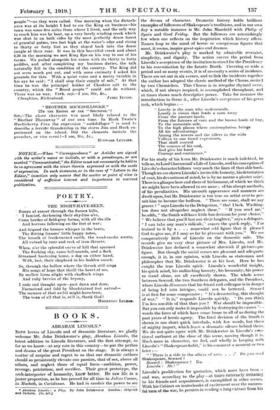THE BOYCOTT WEAPON.
(To THE EMTOP, Or one " Sezcmoa.")
Sin,—We have seen little notice lately of this weapon as the one controlling and faultless power by the excretes of which the League of Nations could unquestionably bring any recalcitrant member to heel at once. I think the last direct reference to it in the Spectator was that of January 27th, 1917, where at p. 93 you say :— " We promised last week that we would attempt on another occasion to say where our hopes for peace lay, and we shall take the opportunity of Mr. Wilson's speech to set forth our plan. We believe that the mast hopeful thing that can be done. and though it seems a small thing it may turn out to be a very great thing, is to induce the Powers to agree to observe the sanctity of Treaties. We desire next that they should each and all promise not to go to war with any offending Power, but to black-list it ... When it was decided that a Treaty had been broken a non-intercourse policy must be effected—unless, of course, some of the Powers, acting in had faith, secretly favoured the condemned Power and really allowed intercourse while pretending to prevent it. We must, however, assume that such acts of bad faith would not arise."
Since that was written much water has passed under West- minster Bridge, but one outstanding plank has risen to the surface, and that is that but for the power of Boycott we would still be sacrificing the best blood of the nation by tens of thousands. I am convinced—and I think all are convinced— that this is the one element of power which ought at least to be attained at the Conference now sitting, and with which we might justifiably expect peace on earth and goodwill to men.— and have at once proportionately reduced armies and navies, bringing a more or less speedy return to pre-war taxation with similar levels in the cost of living.
May I be allowed to record a test of this power which came under any own observation sixty years ago in-West Africa ? I was living then engaged in business in Calabar, which many of your readers will remember is in the Bight of Biafra four or five degrees north of the equator. If my memory serves me right, it was in the year 1890, when the great and deservedly respected King Eyo Honesty I. ruled the country with a just and firm hand alike to Europeans and natives. He received the name Honesty from the straightness of his dealings, and it descended to hie family; for anything I know to the contrary, the title may still exist 'under the British Government. It fell out at one time that a quarrel between the Calabar people and the wild tribes in the interior had arisen over some " trade palaver," and things looked very black for the Cala- harese, who were hopelessly outnumbered by the "Blood people "—as they were called. One morning when the distasrla- ance was at its height I had to see the King on business—hie town was some fire miles front where I lived, and the only way to reach him was by boat, up a very lovely winding creek which was shut in on both sides by the most perfectly dense forest of graceful palms, two feet high at the water's edge and rising to thirty or forty feet as they sloped back into the dense jungle at their rear. It was in this beautiful creek and about 13.30 in the morning we met King Eyo on his way to one of his farms. We pulled alongside his canoe with its thirty to forty ]saddles, and atter completing my business duties, the talk naturally fell to the condition of the country. The King did not seem much put out, and with some curiosity I asked his grounds for this. With a quiet voice and a merry twinkle in his eye be said "I shall stop their supply of salt." At that time he was the principal holder of Cheshire salt in the country, which the "Stood people" could not do without. There was no war. Verb. sap.—I am, Sir, &c.,



































 Previous page
Previous page